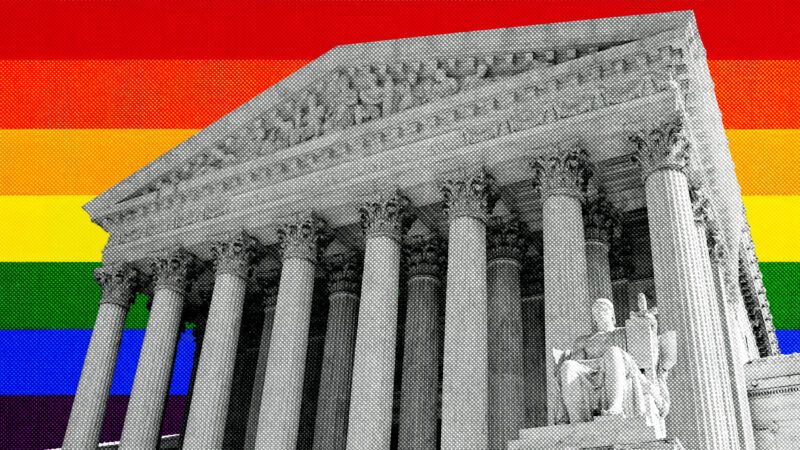Is Conversion Therapy Free Speech?
Colorado says no. Supreme Court justices seem skeptical.

Imagine a conservative state bans therapists from talking to gay or transgender minors in a way that affirms their sexual orientation or gender identity. That would cross a line, right? Whatever conservative lawmakers personally think about homosexuality or gender dysphoria, preventing LGBTQ-affirming counseling is an affront to the First Amendment.
For this same reason, Colorado's ban on conversion therapy should be opposed.
You are reading Sex & Tech, from Elizabeth Nolan Brown. Get more of Elizabeth's sex, tech, bodily autonomy, law, and online culture coverage.
It's one thing to personally oppose counseling practices aimed at suppressing same-sex attraction or someone's questioning of their gender identity. But it's quite another to use government power to stop anyone from engaging in this sort of talk therapy—and the latter is incompatible with the U.S. Constitution.
That's the crux of Kaley Chiles' case before the U.S. Supreme Court this week.
And oral arguments in the case yesterday made clear that more than just Colorado's conversion therapy ban is at stake here. If allowed to stand, it could pave the way for talk therapy restrictions based on conservative views of sexuality and gender, too.
Is Therapy Speech or Conduct?
In Chiles v. Salazar, the Court is being asked to consider whether Colorado's conversion therapy ban violates the First Amendment. The state bans licensed therapists and counselors from engaging in "any practice or treatment" that "attempts or purports to change" a minor's sexual orientation or gender identity or any "behaviors or gender expressions" associated with it. It also bans treatments aimed at "eliminat[ing] or reduc[ing] sexual or romantic attraction or feelings toward individuals of the same sex."
Chiles, a licensed counselor, sued over the law, alleging that it is a form of "viewpoint-based censorship." Chiles is "a practicing Christian who views her career as an outgrowth of her faith," her lawyers wrote in their petition to the Supreme Court. "Many of Chiles's clients are also Christian and specifically seek her help because of their shared faith-based convictions and biblical worldview."
Chiles doesn't seek to impose her beliefs on unsympathetic patients, but "after discussing a client's objectives, desires, and religious or spiritual values," she will sometimes engage with them in counseling designed to suppress same-sex attraction or gender discontent, said her lawyer.
Colorado argued that the conversion therapy law bans conduct, not speech, and this is permitted by the First Amendment. The U.S. Court of Appeals for the 10th Circuit agreed with Colorado.
Because other federal appeals courts have held that counseling conversations are speech, not therapy, the case was prime fodder for Supreme Court review.
Justices Seem Skeptical of Colorado Claims
During oral arguments yesterday, Chiles' lawyer argued that if there were medical conduct involved—things "like administering drugs, performing procedures, conducting examinations"—then "that would take it outside of the arguments we're making." But because Chiles' work only involves speech and yet would fall into the purview of the ban, that makes the ban an unconstitutional viewpoint-based restriction on speech and subject to a standard of review known as strict scrutiny.
But "a healthcare provider cannot be free to violate the standard of care just because they are using words," lawyer Shannon W. Stevenson argued on behalf of the state of Colorado. Stevenson also noted that the law only banned conversion therapy by state-licensed professionals, not by unlicensed church counselors or life coaches.
Stevenson also argued, somewhat nonsensically, that counseling a teen who wanted to reduce his feelings of attraction for another male would only be banned "if the therapist told him, or he asked, 'Can you help me become straight?'" But "if it was, 'Can you help me cope with my feelings as to how I am and how I want to live my life?' that's permitted." That seems like something of an unworkable legal distinction, and also at odds with the plain text of Colorado's statute, which also bans attempts to change "behaviors" associated with sexual orientation.
In any event, several Supreme Court justices seemed skeptical of Colorado's claim that the regulation doesn't illegally censor speech. And it wasn't just conservative justices who appeared unconvinced that the conversion therapy ban was legal.
"If a doctor says, 'I know you identify as gay, and I'm going to help you accept that,' and another doctor says, 'I know you identify is gay, and I'm going to help you to change that,' and one of those is permissible, and the other is not, that seems like viewpoint discrimination in the way we would normally understand viewpoint discrimination," liberal Justice Elena Kagan said.
"Can a State Pick a Side?"
Taking on the state's argument that the ban was OK because it was consistent with prevailing standards of care, conservative Justice Neil Gorsuch asked if a state "could forbid a regulated licensed professional from affirming homosexuality if that were consistent with the then-prevailing standard of care?" Or, if current prevailing standards of care were to change, "then a state could pass a mirror image statute to Colorado's that prohibits any attempt to affirm changes of gender identity or sexual orientation?"
As this and multiple other lines of questioning from the justices made clear, Colorado's arguments could open the door to states banning talk therapy that doesn't uphold a conservative viewpoint. And this seems like an important consideration at a time when Republicans—from local school board officers up to the president—have been increasingly aggressive about the idea that "gender ideology" is harmful to children.
"It's pretty important that we think about how this would apply to cases down the road," suggested conservative Justice Amy Comey Barrett. "So let me describe medical uncertainty as competing medical views, and let's say that you have some medical experts that think gender-affirming care should be—is dangerous to children and some that say that this kind of conversion talk therapy is dangerous. Can a state pick a side?"
Under Colorado's line of argument, it would seem that they could.
Or, as Chiles' lawyer put it in court yesterday, Colorado's rationale "would allow states to silence all kinds of speech in the counseling room, such as disfavored views on divorce or abortion."
Regulations like Colorado's also make it difficult for the sort of broad and nuanced discussions that are crucial to therapy to take place. After all, not everyone who seeks counseling for issues related to gender will wind up identifying as transgender or nonbinary or anything of the sort. Some will just be uncomfortable with gender roles and norms placed upon them; others will be exploring their identities. A broad but also somewhat vague ban like Colorado's, makes it hard for counselors to really explore the root causes of discomfort. And that's not helpful.
Missouri Attempts to Mislead Voters About Abortion Amendment
In 2024, Missourians passed Amendment 3, a constitutional amendment protecting abortion access. It specified that "the Government shall not deny or infringe upon a person's fundamental right to reproductive freedom, which is the right to make and carry out decisions about all matters relating to reproductive health care, including but not limited to prenatal care, childbirth, postpartum care, birth control, abortion care, miscarriage care, and respectful birthing conditions."
Now, Missouri Republicans are trying to reverse this with a new ballot measure—also called Amendment 3—that would repeal the previous amendment and also enshrine in the state's constitution a ban on "sex-change procedures for children."
But they're also obscuring the true nature of the amendment in voter information about the measure. An initial ballot summary "was so blatantly biased that a judge has already forced Secretary of State Denny Hoskins to rewrite it—twice," write Jessica Valenti and Kylie Cheung. "The third version finally passed legal muster, but that doesn't mean it's anywhere close to unbiased."
Here's what the summary language now approved by a judge says the new Amendment 3 would do:
• Guarantee women's medical care for emergencies, ectopic pregnancies, and
miscarriages.
• Ensure women's safety during abortions.
• Ensure parental consent for minors.
• Repeal Article I, section 36, approved in 2024; allow abortions for medical
emergencies, fetal anomalies, rape, and incest.
• Prohibit sex-change procedures for children.
This summary "doesn't explicitly state that the amendment, if passed by voters, would again ban most abortions in Missouri," notes St. Louis public radio. It also gives the (false) impression that the amendment would newly allow abortions for medical emergencies and so on.
"The ACLU of Missouri said in a statement it intends to appeal not only the ballot summary and fair ballot language, but also for a violation of the state's single subject clause," St Louis public radio reports.
"Despite three attempts, the state's ballot summary still fails to give voters a clear and honest understanding that Amendment 3 would end Missourians' fundamental right to reproductive freedom, a right we approved just last November," Tori Schafer, director of policy and campaigns for the ACLU of Missouri, said.
More Sex & Tech News
IDs compromised on Discord: As age verification laws proliferate, we're seeing more and more examples of the kinds of security breaches that I and many other opponents of these laws have warned about. The latest comes from Discord, where some users may have had their driver's license or passport images compromised. "Recently, we discovered an incident where an unauthorized party compromised one of Discord's third-party customer service providers," the company revealed on October 3. Breached data may have included Discord usernames, real names, email addresses, IP addresses, and some "government‑ID images (e.g., driver's license, passport) from users who had appealed an age determination."
Rich schools more likely to have cell phone bans: A new study looks at cell phone policies in U.S. public schools. In the representative sample studied, almost all—96.68 percent—had some sort of official cell phone policy. But these policies varied widely. Overall, "bans were less strict in high schools," note the study authors. "Bans were also less strict in low-poverty and medium-poverty neighborhoods compared with high-poverty neighborhoods; the reasons for this pattern warrant further investigation."
A robot tax? Senate Democrats are pushing a "robot tax" that would fine companies for using artificial intelligence to "expand automation." Such a tax "would hobble American innovation," Kevin Frazier writes.
Today's Image



Show Comments (109)